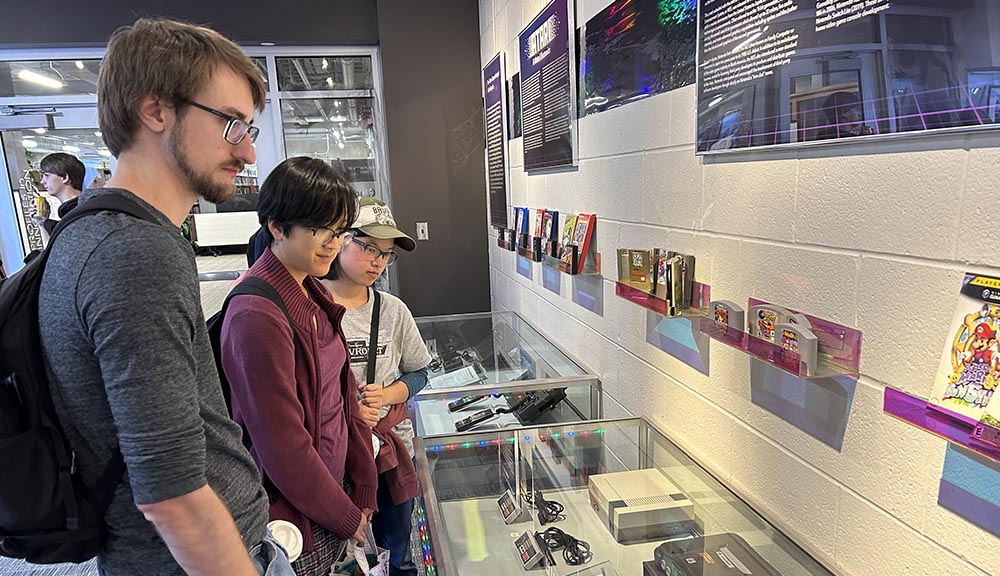Worcester Polytechnic Institute (WPI) is ranked No. 6 on a list of the 10 best places to study game design released today by The Princeton Review. In the survey, which will be published in the April 2011 issue of GamePro magazine, the WPI Interactive Media & Game Development (IMGD) major program, the first of its kind in the nation, was compared to undergraduate game design programs in the United States and Canada. WPI placed No. 7 on the list last year.
- Read the March 1, 2011, USA Today article and The New York Times’ “The Choice” blog post on the rankings.
The Princeton Review, known for its annual "best" college rankings, developed its 2nd annual "Top Schools for Video Game Design Study" list with GamePro, which reaches more than three million gamers each month and is considered one of the most respected publications in the video game industry. The list will also be published on the GamePro and Princeton Review websites. Of the 10 undergraduate-level programs listed, WPI is the highest-ranking institution in the Northeast.
"Our students don’t just study how to make things, they actually do make things;" said Mark Claypool, professor of computer science and director of WPI’s IMGD program, which launched in 2005. "That’s why WPI’s game design program is so different from the others. Whether those things are games, interactive fiction, virtual environments, art installations, collaborative performances, or forms of new media that haven’t been invented yet, we expect our students to be at the forefront of exploring worlds that we can currently only imagine. The fact that so many of our students are already shining in the game industry—many even before they graduate—is an indication of the high quality of our students."
The four-year undergraduate IMGD program integrates the artistic (art, music, and story), technical (programming), and design (software, user experience, and game) aspects of game creation. Students receive a base education in these areas, and then select an artistic or technical concentration as the focus for the remainder of their program. They also study social and philosophical issues associated with games and related media. The IMGD major, supported by WPI’s Computer Science and Humanities and Arts departments, has 16 full-time faculty members, 11 industry advisors, and four IMGD-specific laboratories. A master’s degree program will launch this fall.
The major is rich with success stories:
- WPI students have placed in the top three in the Massachusetts Game Challenge run by former Red Sox pitcher Curt Schilling’s 38 Studios in each of the past three years. (Schilling, who sits on the WPI IMGD Advisory Board, was the keynote speaker at WPI’s 2010 Commencement).
- The IMGD program and Higgins Armory Museum won a highly competitive $50,000 Digital Humanities Start-Up Grant in 2010 from the National Endowment for the Humanities to create an interactive "virtual joust" experience at the Worcester-based museum of medieval arms and armor. Faculty and students are developing Virtual Joust, which will premiere this fall as the permanent centerpiece of a Higgins Armory exhibition, presents the story of tournaments and jousting with a modern twist; the lance of yesteryear will be ousted in favor of a Nintendo Wii Remote.
- Three games developed by WPI faculty, students, and alumni have been chosen to be displayed at this month’s Boston Indie Showcase at PAX East (March 11-13 in Boston). Blinding Silence, developed by senior Elliot Borenstein, graduate Ryan Bedell, graduate Drew Hickcox, and senior Lukas Wong-Achorn, won the 2010 WPI Provost’s Award for IMGD MQP of the year. Another game, Smuggle Truck, is in development by alumni Yilmaz Kiymaz and Alex Schwartz. In addition, IMGD instructor Peter Jones is involved in the development of the game Snapshot. The teams will have booth space on the exhibition floor of the convention, which draws thousands of game industry professionals and fans, and the opportunity to demonstrate their games.
- Two WPI students, Tamlyn Miller and Ryan Chadwick, landed coveted credits in 2009 for design, writing, and voiceover work on a video game by Cambridge, Mass.-based Dejobaan Games LLC. The game– "AaaaaAAaaaAAAaaAAAAaAAAAA!!! – A Reckless Disregard for Gravity" – was nominated for an "Excellence in Design" award at the 2010 annual Independent Games Festival in San Francisco.
Of the approximately 500 programs where students can study game design in the United States and Canada, The Princeton Review recognized 30 (10 undergraduate, 10 graduate, and 10 honorable mentions) based on a survey of administrators at institutions offering game design course work or degrees. The survey covered such areas as academics, faculty credentials, and graduates’ employment and career achievements. The Princeton Review also considered data on scholarships, financial aid, and career opportunities.
Robert Franek, Princeton Review senior vice president and publisher, said, "We salute Worcester Polytechnic Institute for its commitment to the field of video game design study and the innovative program it offers. For students aspiring to work in this burgeoning field, and for the companies that will need their creative talents and trained skills, we hope this project will serve as a catalyst for many successful connections."
"There are now more colleges and universities than ever focusing on game development, and graduate school has become a viable option for game design," said Marci Yamaguchi Hughes, president of GamePro Media. "Game design study is an incredibly relevant subject for our readers, especially given the upcoming Game Developers Conference, which showcases the real-world application of this education."


